Kingpins: The Story of Nigeria’s most Notorious Armed Robbers : Episode 4 – Isiaka ‘Mighty Joe’ Busari
Isiaka ‘Mighty Joe’ Busari – the ‘Strongman of Idi Oro’ whose execution still generates controversy
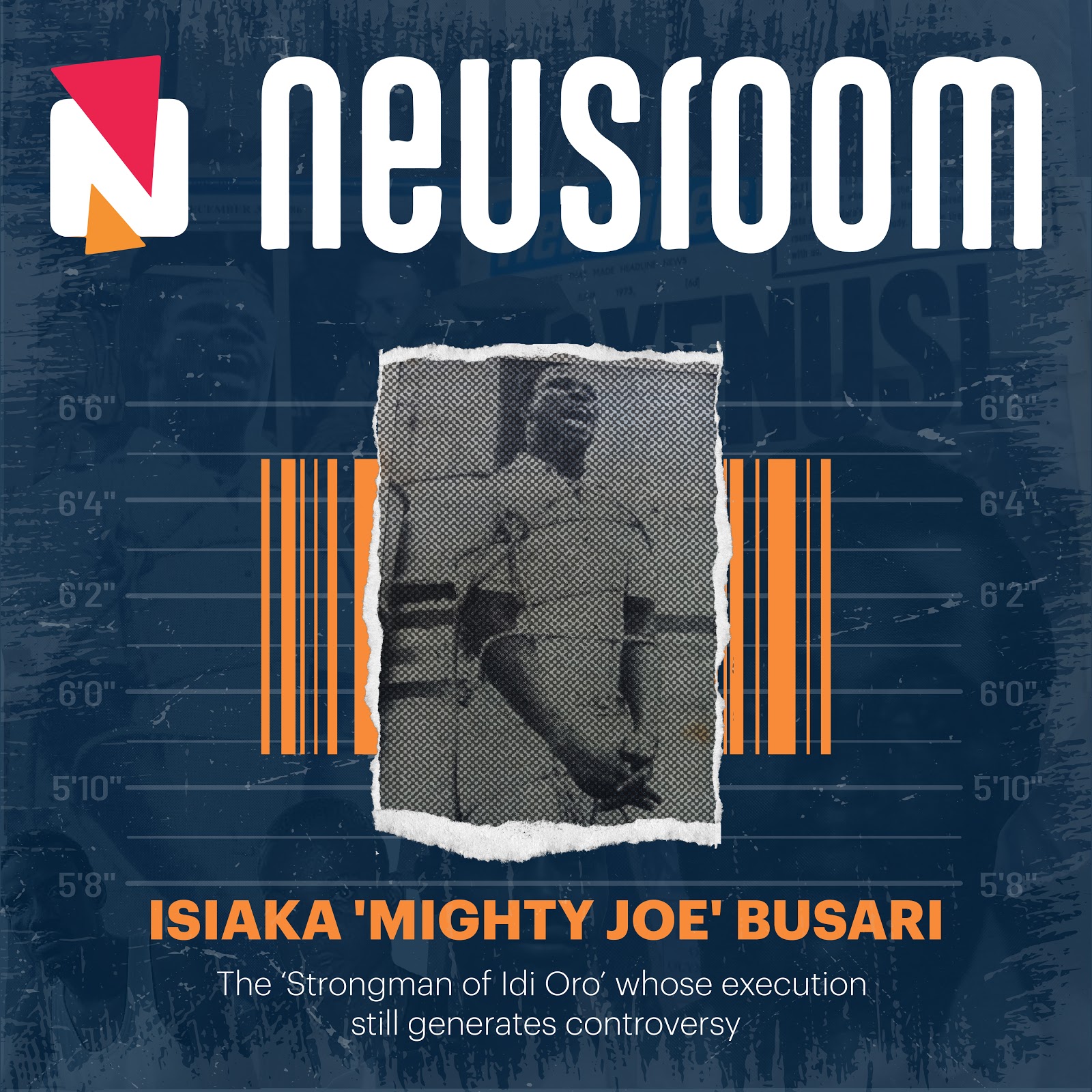
Isiaka ‘Mighty Joe’ Busari – the ‘Strongman of Idi Oro’ whose execution still generates controversy
Written by Michael Orodare for Neusroom
Additional reporting by Folayan Adejoke
13 April 2021
On the morning of June 6, 1973, armed policemen arrived at Kirikiri prisons, in Apapa, Lagos, and marched straight to the cell where Isiaka Busari aka Mighty Joe had been waiting for his final days.
As the sound of footsteps became louder, from his cell, Mighty Joe, the self-styled ‘Strong man of Idi-Oro’, became apprehensive. He knew his day at the Bar beach had come. The previous day, his lawyer had informed him that his appeal for clemency to Governor Mobolaji Johnson failed. Death was inevitable.
Before the policemen got to his cell, he asked for a stick of cigarette. As he puffed the smoke into the air, the gates of his cell were opened. He was cuffed and led away from Kirikiri to the bar beach where a crowd of spectators was waiting to witness his execution.
At 11 am, an army officer gave the firing order and Mighty Joe was riddled with bullets. He yelled and protested his innocence but it made no difference.
“May God bless everybody, both my friends and enemies. Tell my wife, my mother, and my in-law to keep fit,” those were his last words before he breathed his last, according to the Daily Times of June 7, 1973.
In the 1970s, the Lagos bar beach was the spot for executing convicted armed robbers and coup plotters. The likes of Ishola Oyenusi, Babatunde Folorunso, and other convicted armed robbers had had their days behind the stake.
In 1973 it was the turn of Isiaka who was arrested for armed robbery in 1971 by a team of policemen led by Assistant Superintendent of Police S. Fagbuyi at the Idi-Oro motor park in Mushin, Lagos.
Since his execution in 1973, some of the people familiar with Mighty Joe’s story and those who knew him personally have continued to argue that he was never an armed robber. But their voices pale when compared to the multiple historical accounts and media reports crediting several heinous crimes to him. In our research, we found media reports and investigations describing him as “the savage legend who took over the reign of terror from Oyenusi”.
Neusroom investigated the story of Mighty Joe and how he was executed for armed robbery.
We travelled to the National Archive at the University of Ibadan, Oyo State, to review newspaper publications from the early 1970s reporting the arrest and trial of Mighty Joe. Officials could not provide records of the military tribunal sentence that condemned Mighty Joe to death. We also spoke with a former editor of Daily Times newspaper in the 1970s, Ben Lawrence, and Bishop Kayode Williams, one of the proteges of Ishola Oyenusi. Our findings revealed that Mighty Joe may just be another staggering example of how the military tribunals and the Nigerian judicial system wronged innocent people.
Who was Mighty Joe?
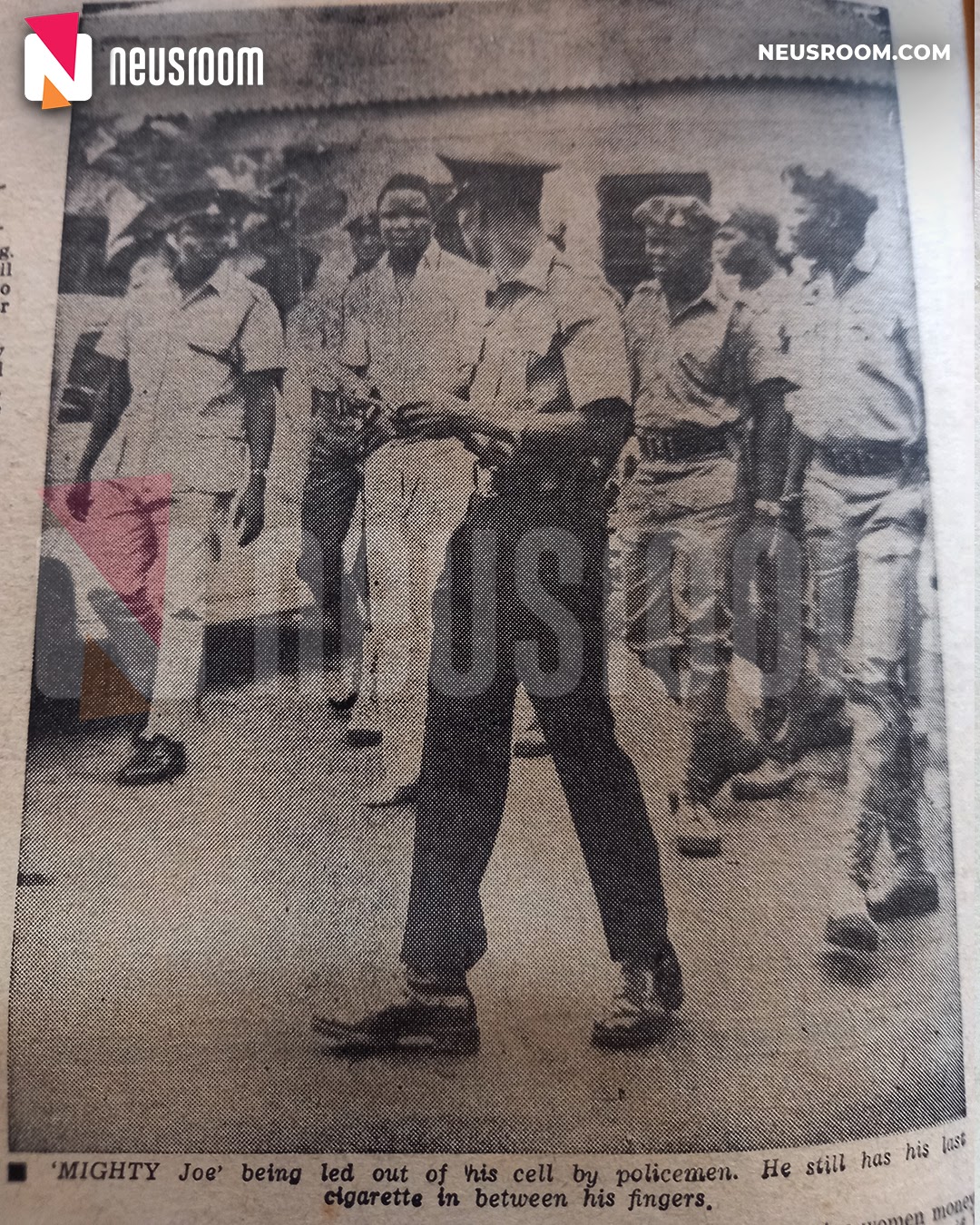
Mighty Joe was led out of prison to the bar beach with his cigarette handy. Photo: Headlines Newspaper 1973
According to the Headlines newspaper of July 1973, the hefty Mighty Joe was born to a humble Muslim family in Itafaji, Lagos Island.
“He was so bad that he was sent to the reformatory, but this character molding institution did not change him,” the newspaper reported in July 1973.
The Daily Times said Mighty Joe started as a street thug, terrorising motorists, traders, and nubians in Idi-Oro and other areas in Mushin before “taking to robbery”.
Mighty Joe told a crime reporter the late Chinaka Fynecontry of the Daily Times that he worked as a steward for politicians (which means he was a political thug). He earned £65 monthly (N130 in 1973, N34,000 in 2021), and N2 daily for feeding.
In 1966, Mighty Joe relocated from Lagos Island to Idi-Oro, an area in Mushin that has maintained its notoriety status for more than five decades. At Idi-Oro, he violently contented for space with two other rival groups that had dominated the area before his arrival. When the truce was eventually reached, he started selling Indian hemp: adding bullying, and extortion, to his trade.
Bishop Kayode Williams told Neusroom that “Mighty Joe was a thug and an Indian hemp dealer.”
Williams, a protege of Oyenusi, also took to robbery at a very young age, spent 10 years in jail, and came out a renewed man, preaching the gospel and championing prison reforms.
“I know Mighty Joe very well, he also knew me, we used to drink together at Idi-Oro. He was just a common Lagos street thug,” a veteran journalist and former Editor of Daily Times, Ben Lawrence, told Neusroom correspondents in an exclusive interview at his Lagos residence on Tuesday, March 2, 2021. Lawrence is now 84 years old
His many atrocities
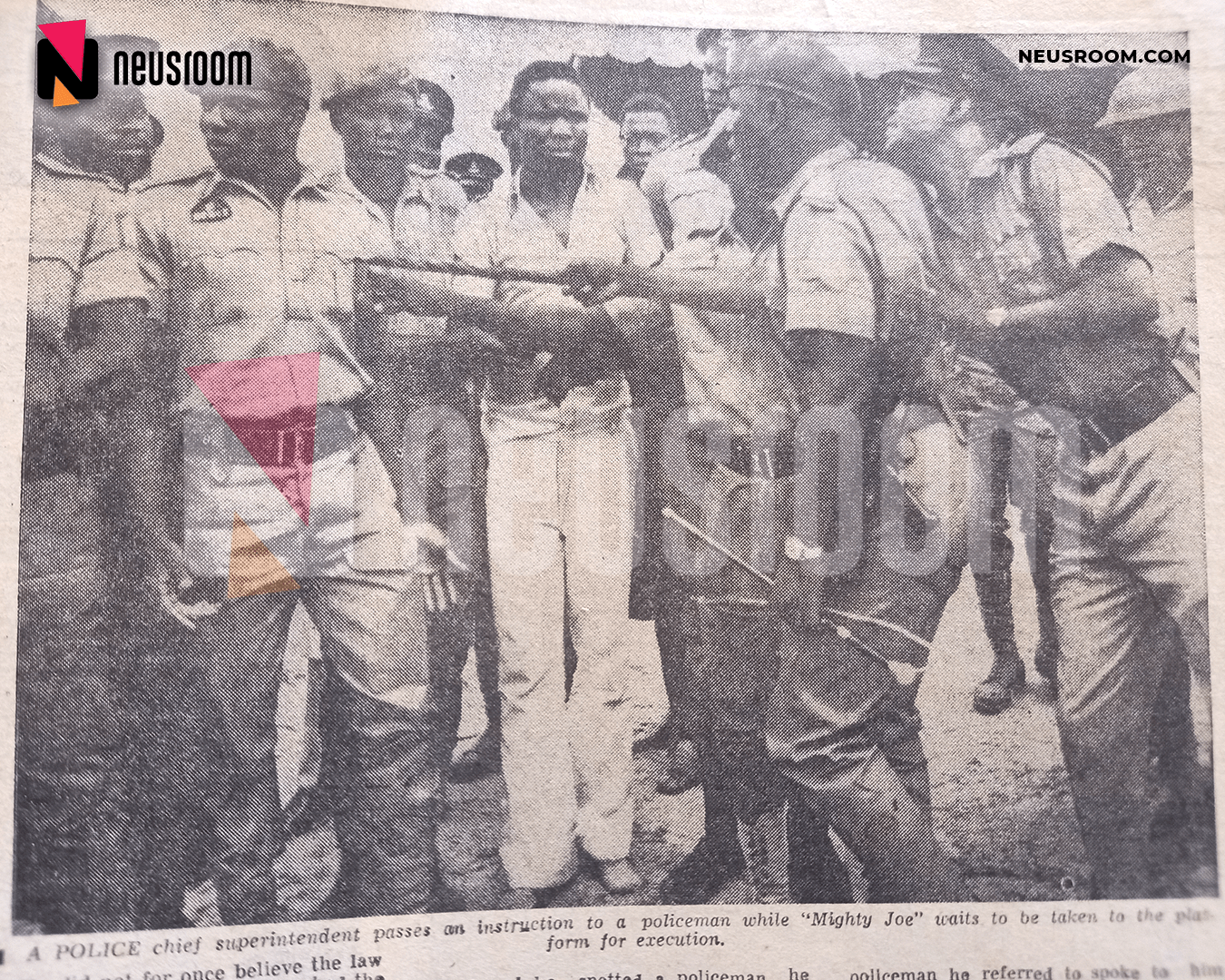
Mighty waits for his execution at the Lagos bar beach. Photo: Headlines Newspaper 1973
Multiple media reports including reports in the Daily Times and Headlines newspaper seen by Neusroom at the National Archive say Mighty Joe was a notorious street thug who extorted, bullied, and harassed sex workers.
“He always picked on jewelry shops and with his retinue of aides, Mighty Joe went into shops and picked whatever he wanted. Those who questioned his audacity paid dearly for it. He ordered his boys to loot the shop of anyone who challenged him”.
The newspapers also reported that he raided homes and hotels extorting money from people. To put him off, some began to pay him protection fees.
Whenever he ran out of money, he reportedly stood in the road and forcefully extorted money from minibus drivers, which is not different from what ‘agberos’ now do on Lagos roads.
For Mighty Joe, every Friday was a ‘black day’: he wore black clothes and black berets. His aides fretted whenever he wore black.
Before his final arrest in 1971, he had been to prison several times.
Many media reports claimed he was Oyenusi’s second-in-command, but Bishop Kayode Williams told Neusroom that Mighty Joe was never a member of the Oyenusi gang nor was he an armed robber.
How he was arrested and executed for robbery
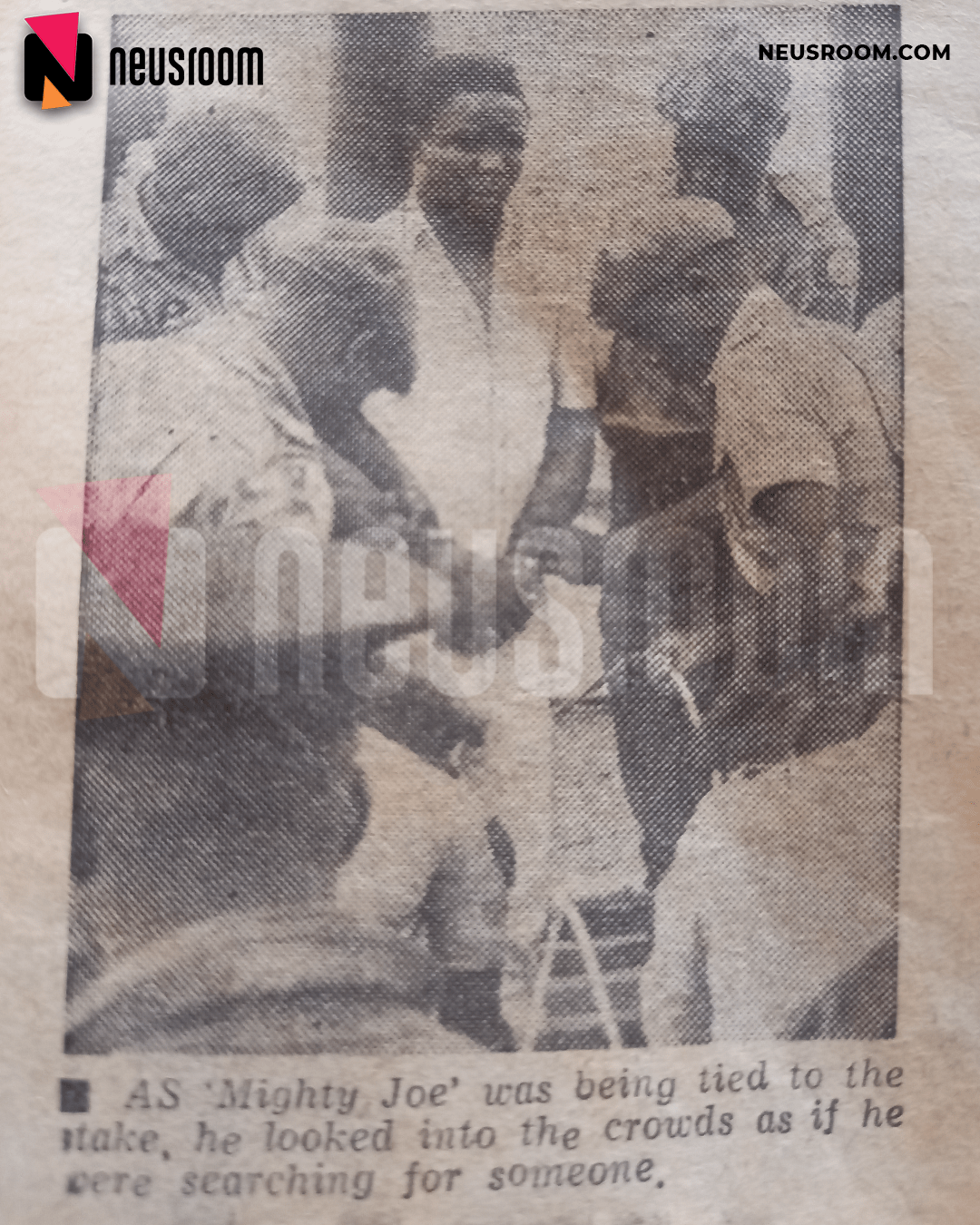
End of the road: Mighty Joe executed like a notorious armed robber. Photo: Headlines Newspaper 1973
Mighty Joe was arrested at the Idi-Oro motor park in 1971 by a team of policemen led by Superintendent S. Fagbuyi from the Criminal Investigation Department (CID), Panti, in Yaba, Lagos.
The police went for him after a businessman transporting textile materials from Apapa to western states reported to the CID that he was waylaid at Majidun bridge in Ikorodu and the assailants carted away all his goods and also stole N400 from him. The detectives went after Mighty Joe as the mastermind of the attack.
Before the Majidun incident, Mighty Joe had reportedly snatched N10 at Right Time Hotel. When the CID announced his arrest, the anti-robbery detectives also announced that they had been searching for him in connection with a robbery at Right Time Hotel, it was a double whammy for Mighty Joe and the beginning of his end.
As a regular at the prisons, he must have thought it was just a storm in a teacup and he would be back on the streets soon. He was wrong. It was a journey of no return.
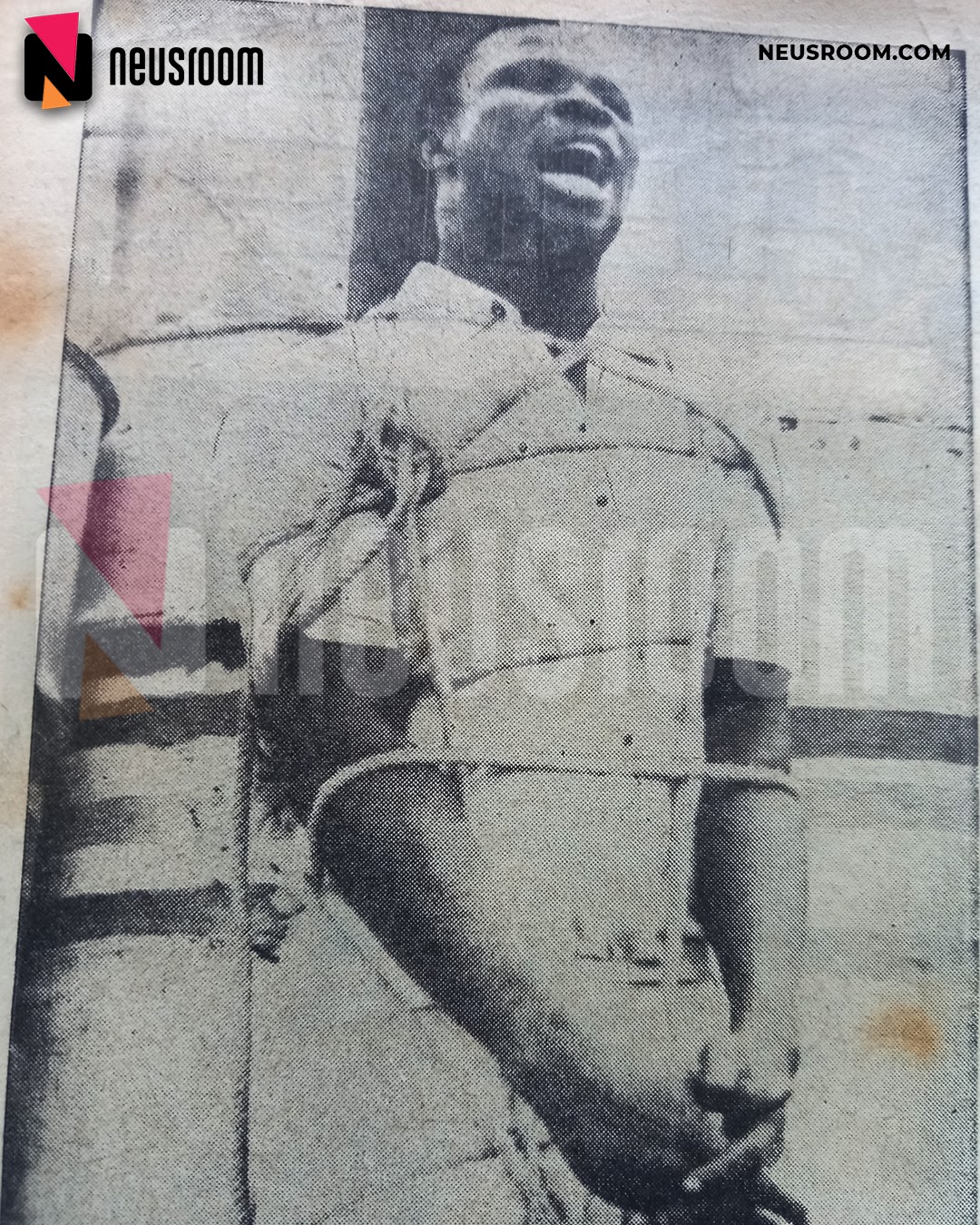
The ‘strong man of Idi-Oro was silenced at the Lagos bar beach in 1973. Photo: National Archive/Headlines Newspaper 1973
The Robbery and Firearms Tribunal set up through Decree 1970 by the military regime of Yakubu Gowon sentenced Mighty Joe to death on March 30, 1973.
“He opened his mouth and looked into the crowd in the court as if he were searching for someone. He was immediately led away, his lawyer’s appeal to Governor Johnson for clemency failed,” the Headlines reported.
On June 6, 1973, Mighty Joe was executed for armed robbery.
Williams described the sentencing of Mighty Joe to death as a ‘bad judgement’.
He told Neusroom “although he [Mighty Joe] was executed like an armed robber, I can tell you authoritatively that he was never an armed robber.”
Ben Lawrence the editor also corroborated his claim.
The Mighty Joe we knew – Williams and Lawrence share details
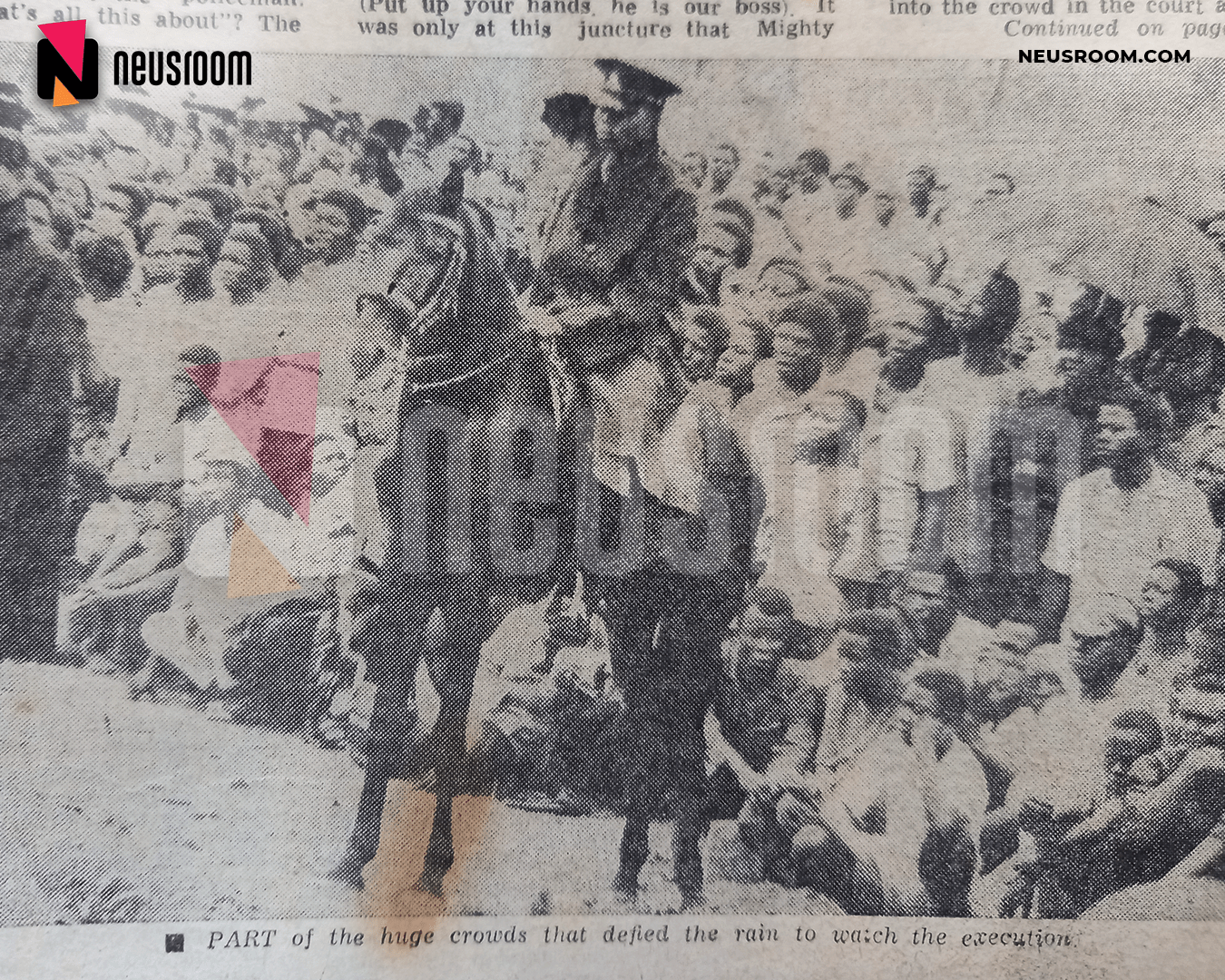
Thousands of people gathered at the Lagos Bar beach to watch how Mighty Joe was publicly executed. Photo: National Archive
Williams told us Mighty Joe was a thug and an Indian hemp dealer based in Idi-Oro, Mushin.
“He was troublesome and was an area boy. He was usually involved in political fights or land disputes,” he said.
Why was he charged for armed robbery?
“He was embroiled in a fight and was arrested, his case was later charged as an armed robbery case. It was a bad judgement,” Williams told Neusroom.
Ben Lawrence the editor said Mighty Joe was “one of those boys” following Fela Anikulapo-Kuti, the afrobeat legend, during his lifetime.
Before moving ‘The Afrika Shrine’ to Ikeja after the 1977 attack on his house by soldiers, Fela started at Afro-Spot, on the junction of Folarin street, opposite his former house at 14A, Agege Motor Road, in Idi-Oro, Mushin, where Mighty Joe was ‘king of the street’.
Lawrence said Mighty Joe ran into trouble with the police and they killed him.
“Did he even face court?” he wondered.
“I wouldn’t say he was an armed robber, but he was a strong-armed man. I know him very well and he knew me. I knew him as a journalist. “He couldn’t even try me,” the 85-year-old boasted.
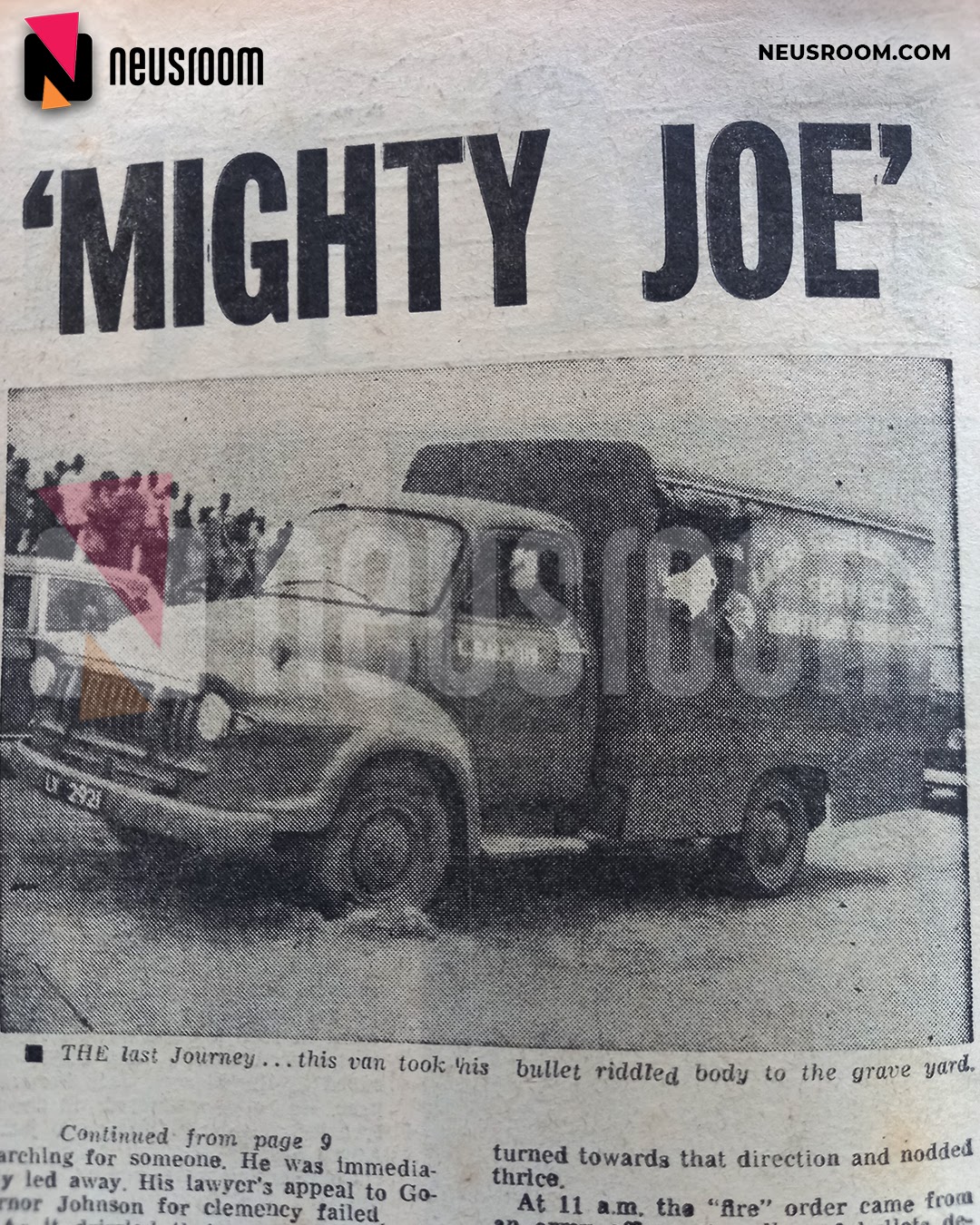
This truck conveyed the remains of Mighty Joe to the cemetery. Photo: National Archive/Headlines newspaper.
How they met
Lawrence said in those days journalists didn’t sit to wait for news, they move around and made friends with the ‘good and the bad’ of society. It was in the process he met Mighty Joe at the club.
“We go to clubs together. We knew all the crime families in Mushin and all those places.”
Asked why the Daily Times’ also reported that Mighty Joe was an armed robber, he asked, “who was an armed robber then?”
“If you are caught with a knife, police will arrest you and charge you for armed robbery,” he said. “You can only report what the police presented to the tribunal. They just wanted to eliminate him.”
Daily Times was a Nigerian government-owned newspaper, Mighty Joe was being prosecuted by the government, so it may have been difficult for the newspaper to take an editorial stand against the position of the State.
Could Mighty Joe be a victim of a conspiracy as some historical accounts claimed? Lawrence said he doesn’t know, but he thinks “they wanted to eliminate him because he was one of the people they considered a nuisance.”
“Long after that,” he said “Fela’s case came. Fela’s activism had started at that time. He [Mighty Joe] was eliminated with Oyenusi and Folorunsho. Those were robbers. They were killed in ‘71 and he was executed in ‘73.
The fear of being labeled a thief and his history of notoriety may have deterred many who knew him from testifying in his favour.
Williams said “Many people don’t know about him that is why people couldn’t come out to defend him. Even now many people don’t know about him. He is just a myth.”
When popular narratives run against an unliked figure, they become like a plague no one wants to associate with, using today’s parlance, cancel culture is invoked on them.
In Idi-Oro where Mighty Joe’s name was synonymous with fear 50 years ago, those familiar with his story refused to talk about him.


Thank God for the God work of my Father Late Chief Fagbuyi the ASP that arrested Mighty Joe, the history will always remember him.
I pray we have thesame committed police officer like him again
Fantastic research. I knew about the story behind the story and was actually explaining it on WhatsApp to an incredulous audience who obviously did not believe me and then I searched and found this narrative that I had know all along. I think it was actually =N=1:00 One Naira he snatched which was the most unbelievable aspect of the story.